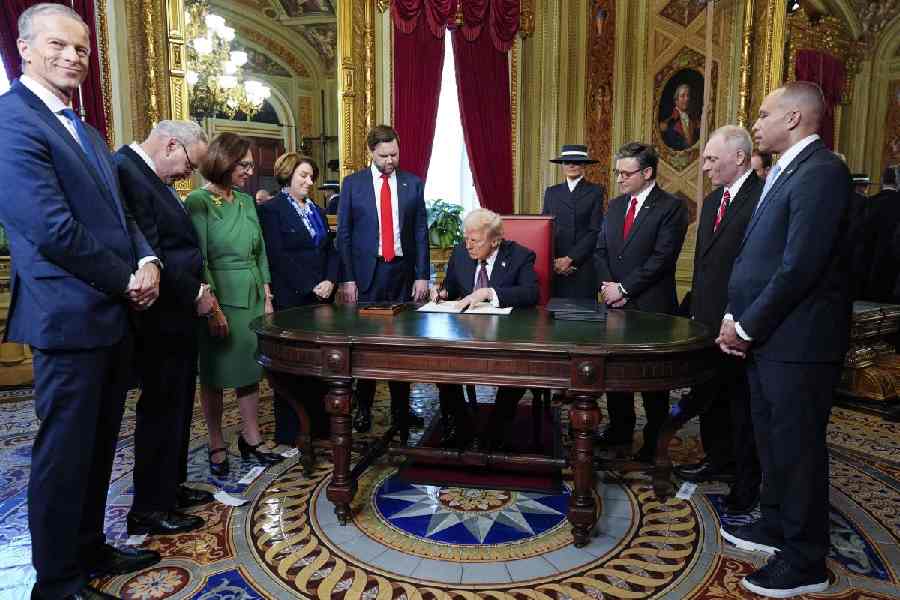 Tuesday, 21 January 2025
Tuesday, 21 January 2025
 Tuesday, 21 January 2025
Tuesday, 21 January 2025
President Donald Trump has begun his promised flurry of executive action on Day 1.
With his opening rounds of memoranda and executive orders, Trump repealed dozens of former President Joe Biden's actions, began his immigration crackdown, withdrew the US from the Paris climate accords and sought to keep TikTok open in the US, among other actions. He pardoned hundreds of people for their roles in the Jan. 6, 2021, attack on the US Capitol.
Earlier in the day, Trump, 78, took the oath of office in the Capitol Rotunda, where a mob of his supporters had rampaged on January 6 in an unsuccessful attempt to reverse his 2020 loss to Joe Biden.
Here's a look at some of Trump's initial actions and upcoming plans:
Pardons in the January 6 US Capitol attack
As he promised repeatedly during the 2024 campaign, the president issued pardons late Monday for about 1,500 people convicted or criminally charged in the January 6 attack on the U.S. Capitol as Congress convened to certify Biden's 2020 victory over Trump.
His decision to pardon supporters who attacked the U.S. Capitol on Jan. 6, 2021, is sure to enrage police, lawmakers and others whose lives were put at risk during an unprecedented episode in modern U.S. history.
Roughly 140 police officers were assaulted during the attack, with some sprayed with chemical irritants and others struck with pipes, poles and other weapons. Four people died during the chaos, including a Trump supporter who was shot dead by police.
Trump ordered 14 leaders of the far-right Oath Keepers and Proud Boys militant groups, who were serving long prison sentences, released from prison early, but left their convictions intact.
Separately, Trump ordered an end to federal cases against “political opponents” of the Biden administration — meaning Trump supporters. He said Monday that he would end “weaponization” of federal law enforcement but his actions seemed targeted only to help his backers.
The economy and TikTok
In a made-for-TV display at Capital One Arena on Monday evening, Trump signed a largely symbolic memorandum that he described as directing every federal agency to combat consumer inflation. By repealing Biden actions and adding his own orders, Trump is easing regulatory burdens on oil and natural gas production, something he promises will bring down costs of all consumer goods. Trump is specifically targeting Alaska for expanded fossil fuel production.
On trade, the president said he expects to impose 25% tariffs on Canada and Mexico starting February 1, but declined to flesh out his plans for taxing Chinese imports.
Trump also signed an order intended to pause Congress' TikTok ban for 75 days, a period in which the president says he will seek a U.S. buyer in a deal that can protect national security interests while leaving the popular social media platform open to Americans.
America First
As he did during his first administration, Trump is pulling the US out of the World Health Organization. He also ordered a comprehensive review of US foreign aid spending. Both moves fit into his more isolationist “America First” approach to international affairs.
In more symbolic moves, Trump planned to sign an order renaming the Gulf of Mexico, making it the Gulf of America. The highest mountain in North America, now known as Denali, will revert back to Mount McKinley, its name until President Barack Obama changed it. And Trump signed an order that flags must be at full height at every future Inauguration Day. The order came because former President Jimmy Carter's death had prompted flags to be at half-staff. Trump demanded they be moved up Monday. Another Trump order calls for promoting “Beautiful Federal Civic Architecture.”
Trump directs the State Department that the foreign policy of the US shall "champion core American interests" and always put America and its citizens first.
“From this day forward, the foreign policy of the United States shall champion core American interests and always put America and American citizens first,” Trump said in his executive order.
“As soon as practicable, the Secretary of State shall issue guidance bringing the Department of State’s policies, programmes, personnel, and operations in line with an America First foreign policy, which puts America and its interests first,” the executive order said.
In another executive order, Trump asked for enhanced screening of the visa application process.
“The United States must identify them before their admission or entry into the United States,” it said.
The US must ensure that admitted aliens and aliens otherwise already present in the country do not bear hostile attitudes toward its citizens, culture, government, institutions, or founding principles, and do not advocate for aid, or support designated foreign terrorists and other threats to the national security, Trump said in the executive order.
Trump has asked for vetting and screening to the maximum degree possible, of all foreign nationals who intend to be admitted, enter, or are already inside the US, particularly those aliens coming from regions or nations with identified security risks.
He also ordered identifying countries throughout the world for which vetting and screening information is so deficient as to warrant a partial or full suspension on the admission of nationals from those countries.
Trump ordered evaluation of all visa programmes to ensure that they are not used by foreign nation-states or other hostile actors to harm the security, economic, political, cultural, or other national interests of the United States.

Immigration and national security
Trump reversed several immigration orders from Biden's presidency, including one that narrowed deportation priorities to people who commit serious crimes, are deemed national security threats or were stopped at the border. It returns the government to Trump's first-term policy that everyone in the country illegally is a priority for deportation.
The president declared a national emergency at the US-Mexico border, and he plans to send U.S. troops to help support immigration agents and restrict refugees and asylum.
Trump is trying end birthright citizenship. It's unclear, though, whether his order will survive inevitable legal challenges, since birthright citizenship is enshrined in the U.S. Constitution.
He temporarily suspended the US Refugee Admission Programme, pending a review to assess the program's “public safety and national security” implications. He's also pledged to restart a policy that forced asylum seekers to wait over the border in Mexico, but officials didn't say whether Mexico would accept migrants again. And Trump is ending the CBP One app, a Biden-era border app that gave legal entry to nearly 1 million migrants.
Meanwhile, on national security, the president revoked any active security clearances from a long list of his perceived enemies, including former director of national intelligence James Clapper, Leon Panetta, a former director of the CIA and defense secretary, and his own former national security adviser, John Bolton.
Restoring freedom of speech
Another significant order that he signed was to "restore freedom of speech and ending federal censorship." This comes after Trump and his allies have accused Joe Biden and his administration of suppressing free speech on online platforms.
“In America, we believe in free speech and we're bringing it back starting today to stop the weaponisation,” Trump said before signing the executive order at the Capitol One Arena here.
Climate and energy
As expected, Trump signed documents he said will formally withdraw the US from the Paris climate agreements. He made the same move during his first term but Biden reversed it.
Additionally, Trump declared an energy emergency as he promised to “drill, baby, drill,” and said he will eliminate what he calls Biden's electric vehicle mandate.
Overhauling federal bureaucracy
Trump has halted federal government hiring, excepting the military and other parts of government that went unnamed. He added a freeze on new federal regulations while he builds out his second administration.
He formally empowered the so-called Department of Government Efficiency, which is being led by Elon Musk, the world's richest man. Ostensibly an effort to streamline government, DOGE is not an official agency. But Trump appears poised to give Musk wide latitude to recommend cuts in government programs and spending.
In an executive order issued late on Monday, the White House said that within 120 days of the order, government officials will develop and send to agency heads a federal hiring plan that will "restore merit to government service."
The government hiring freeze is being paired with a return-to-office order which would see many government teleworkers forced to commute to work five days a week.
"Heads of all departments and agencies in the executive branch of Government shall, as soon as practicable, take all necessary steps to terminate remote work arrangements," the White House said immediately after the president signed the order.
The order requires employees "to return to work in-person at their respective duty stations on a full-time basis, provided that the department and agency heads shall make exemptions they deem necessary."
Diversity, equity and inclusion and transgender rights
Trump is rolling back protections for transgender people and terminating diversity, equity and inclusion programmes within the federal government. Both are major shifts for the federal policy and are in line with Trump's campaign trail promises. One order declares that the federal government would recognise only two immutable sexes: male and female. And they're to be defined based on whether people are born with eggs or sperm, rather than on their chromosomes, according to details of the upcoming order. Under the order, federal prisons and shelters for migrants and rape victims would be segregated by sex as defined by the order. And federal taxpayer money could not be used to fund “transition services.”
A separate order halts DEI programmes, directing the White House to identify and end them within the government.
Return to power
Trump took the oath of office to "preserve, protect and defend" the U.S. Constitution at 12:01 p.m. ET (1701 GMT), administered by Chief Justice John Roberts. His vice president, JD Vance, was sworn in just before him.
Outgoing Vice President Kamala Harris, who lost to Trump in November, was seated next to Biden in a section with former Presidents Barack Obama, George W. Bush and Bill Clinton. Former Secretary of State Hillary Clinton, who lost to Trump in 2016, sat with her husband Bill. Obama's wife, Michelle, chose not to attend.
The ceremony was moved indoors due to the extreme cold gripping much of the country.
Trump skipped Biden's inauguration and has continued to claim falsely that the 2020 election he lost to Biden was rigged.
Biden, in one of his last official acts, pardoned several people whom Trump has threatened with retaliation, including General Mark Milley, a former chairman of the Joint Chiefs of Staff who Trump has suggested should be executed for holding back-channel talks with China. Milley's portrait was removed from the Pentagon shortly after Trump's inauguration.
He also pardoned five family members minutes before leaving office, citing fears that Trump would target them.
(With input from agencies)







